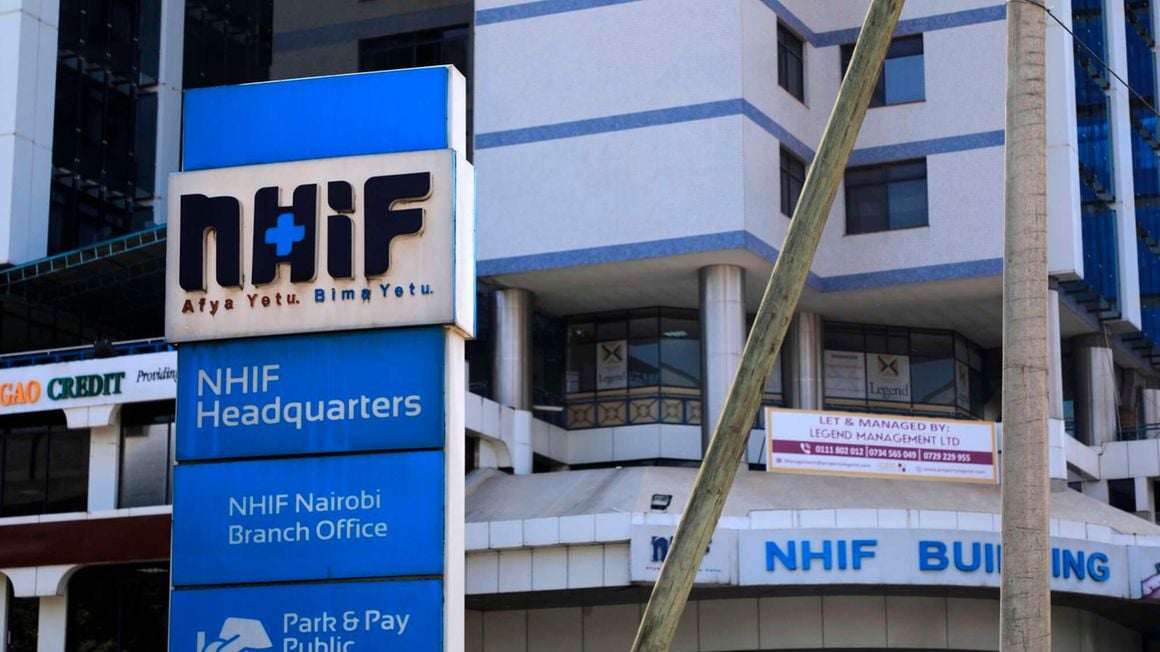
The National Health Insurance Fund building in Nairobi in this photo taken on February 9, 2022. PHOTO | JEFF ANGOTE | NMG By PATRICK ALUSHULA
The National Health Insurance Fund (NHIF) missed out on Sh39 billion premiums after ...
80 percent of members drawn from the informal sector defaulted on monthly contributions, posing a sustainability threat to the public insurer.An actuarial report on the NHIF has revealed that just 1.6 million of the 8.1 million registered informal sector members were making the Sh500 monthly contributions, exposing millions of Kenyans to out-of-pocket medical bills. This means more than 80 percent are in default.
The report, prepared by Kenbright Actuarial & Financial Services, says the voluntary contribution option is draining the NHIF since the majority of those keeping up with payments have chronic sicknesses, meaning they utilise the insurance cover regularly.
“NHIF has lost revenue of Sh39 billion due to these policy lapses. The new law (for compulsory contributions) which cures this issue needs to be implemented urgently. The remaining active group tend to be sicker and claims twice as much from the expected level,” said the report.
“The programme has been the largest contributor to the NHIF’s deteriorating insolvency over the last five years.”
The rising defaults came in the period the number of NHIF claims rose from 297,730 to 332,194 while the value of inpatient claims shot up to Sh16.22 billion from Sh14.19 billion
Read: NHIF drops 43pc of members for defaulting on contributions
Voluntary contributors — usually drawn from the informal sector — pay Sh500 a month to the NHIF while those in the formal sector contribute between Sh150 and Sh1,700 every month, depending on the salary scale.
The NHIF is worried that the continued scenario where it is only the sick who are consistently paying the premiums, with many dropping off once they get the full benefit, is rendering the scheme unsustainable.
The scenario — called adverse selection in insurance terms— is putting at risk the ability of the insurer to settle claims and meet administrative costs.
Adverse selection refers to situations where an insurance company extends coverage to an applicant whose actual risk is substantially higher than the risk known to it.
The Kenbright report shows the NHIF’s unpaid hospital bills increased from Sh10 billion in December 2021 to Sh15 billion partly on the cash crunch caused by policy lapses.
Kenbright is calling for speedy implementation of the NHIF (Amendment) Act that makes it compulsory for every Kenyan above 18 years to contribute and be a member of the fund.
“Mandatory contributions for the informal sector should be implemented with urgency to address the core insolvency issue. The fund may not be able to afford another year of additional losses,” said the report.
The actuaries also say the price of Sh500 per month as set in law needs to be adjusted to factor in annual medical inflation. This comes at a time the State wants the amount lowered to Sh300 a month and contribution pegged on a household.
Read: Kenya banking on Sh300 a month NHIF contribution to spur uptake
The mounting defaults are also a reflection of the struggles that households are facing in an economy where the majority of jobs are in the informal sector and tend to be on and off, making it difficult to plan for monthly bills such as insurance and rent.
The NHIF's hit from defaulted premiums could be more than Sh39 billion when the contribution from the formal sector is factored in
The fund had in a separate disclosure shown total dormant members—from the formal and informal sectors—hit 8.8 million from 5.03 million the year before, making the insurer miss its Sh90.57 billion targeted premium collections for the review period.
Registered members who have defaulted on the monthly premiums are usually locked out of utilising their insurance covers for hospital bills.
The fund occasionally gives a window to defaulters to pay Sh1,500 to reactivate their membership but they have to wait for three months before becoming eligible to enjoy the cover.
→ palushula@ke.nationmedia.com

No comments:
Post a Comment